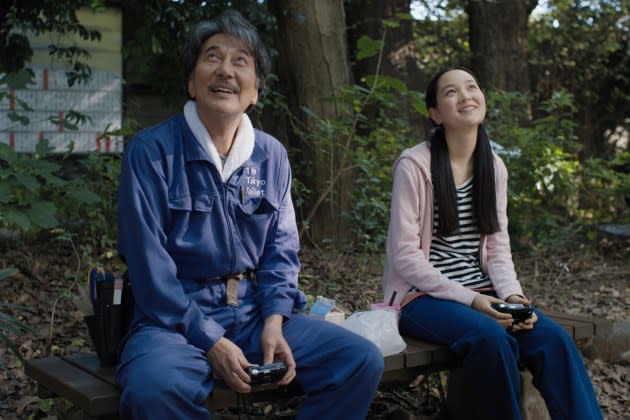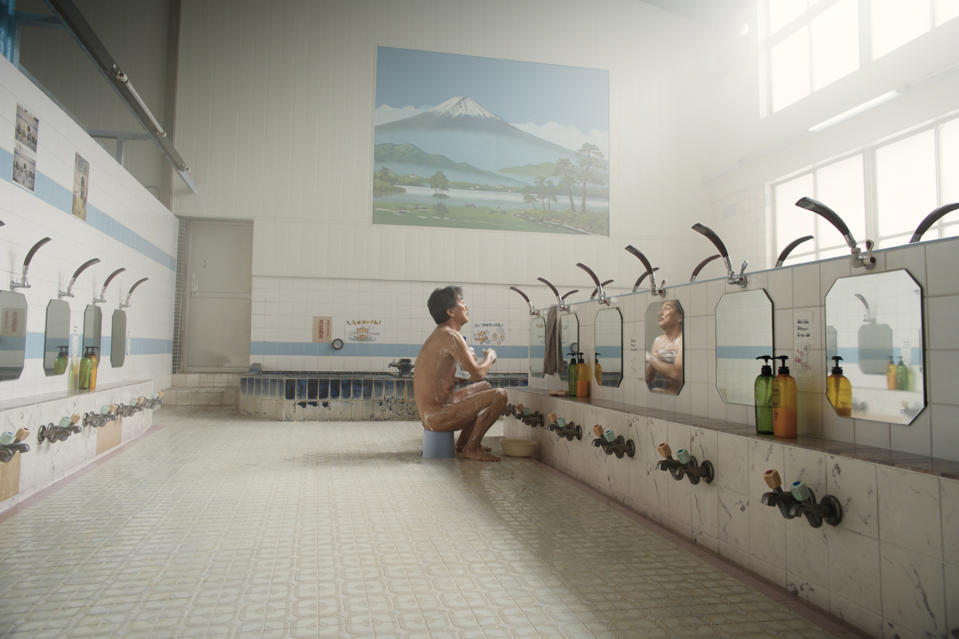‘Perfect Days’ Features the Best Screen Performance in Recent Memory
- Oops!Something went wrong.Please try again later.
- Oops!Something went wrong.Please try again later.
- Oops!Something went wrong.Please try again later.

You may know Kōji Yakusho as the oyster-slurping mystery man from the noodle-Western extraordinaire Tampopo (1985). Perhaps you remember him as the depressed suburbanite who ballroom dances his blues away in the international feel-good hit Shall We Dance? (1996). He’s the reformed felon in the Cannes-winning character study The Eel (1997), a former muse to filmmaker Kiyoshi Kurosawa in the late Nineties and early aughts, the familiar face who graced Hollywood fare like Memoirs of a Geisha (2005) and Babel (2006), and — if you’ve followed his 40-plus years as a major figure in Japanese cinema — the gentleman behind a legion of memorable cops, gangsters, salarymen, and samurai. Not to get all IMDb on you, but the 68-year-old Yakusho has the sort of resume that suggests range, depth, and an enviable ability to contour a role to his strengths rather than go full Method chameleon.
The best movie stars have a way of making you feel like you know them personally. The best actors are constantly surprising you. Those rare folks who occupy both camps like Yakusho somehow manage to keep those two things from feeling contradictory and/or canceling each other out. And yet, no matter how much of his previous work you’ve seen, you’re still not prepared for what he brings to the everyman at the epicenter of Wim Wenders’ Perfect Days. It’s such a carefully considered and exquisitely calibrated performance, sublime in the ways it turns everyday routines into something euphoric and profound in how it elevates small moments into epiphanies. Without Yakusho, it would still be the German filmmaker’s strongest narrative feature in 30 years and the single greatest movie about a public toilet cleaner ever. With him, this small, unassuming tale turns into the kind of earthshaking character study that reminds us why we go to the movies in the first place.
More from Rolling Stone
Oscars' New Rules: Best Picture Inclusion Standards and More
Embassy of Japan Assures Panicked Swifties Pop Star Can Make It to Super Bowl on Time
The “public toilet cleaner” aspect may be a deal breaker for some right off the bat, which is understandable. But that feeling is also one of several preconceptions that Wenders and his co-writer, Takuma Takasaki, want to gently dismantle from the start. The genesis of Perfect Days, in fact, comes from the director being invited to Tokyo to do a series of shorts about the city’s commodes, many of which had been redesigned as something akin to modern-art installments and a source of civic pride. He countered with a story that followed a fictional someone who cleaned these bathrooms. The idea was partially to delve into the life of society’s “invisible people,” the public servants and low-wage grunts who often go unnoticed. Who are they? What are their off-hours like? And why should they deserve less consideration than others?
This is where Yakusho’s character, Hirayama, enters the picture. Like clockwork, he awakes every morning at dawn to the sound of a street sweeper. Hirayama folds up his sleeping mat, brushes his teeth, and shaves. A selection of bonsai plants are watered. He dresses for work — his Tokyo Toilet Project jumpsuit betrays his occupation — and drives to his first lavatory, listening to an impressive collection of classic rock and R&B cassettes. (Wenders has impeccably curated the soundtrack like the veteran music nerd that he is, with deep cuts from the Rolling Stones and Patti Smith, some greatest hits from Van Morrison and Otis Redding, and, yes, that title track from Lou Reed.) He seems to have done this commute a million times before, and will likely do it a million times again.
At lunchtime, Hirayama eats in a nearby park and snaps a single photo, usually of treetops. Judging from the metal boxes of pictures he keeps in his closet, each designated by year, this has been going on for a while as well. After work, he may bicycle to a local bathhouse, or stop by the same restaurant he’s been going to for ages. At night he reads, then goes to sleep. Rinse, repeat. His daily routine gets thrown some curveballs — a flaky coworker (Tokio Emoto) bugs him for quick cash to impress a hipster girlfriend (Aoi Yamada), an impromptu late-night beer with a terminally ill man (Masahiro Kômoto), the unexpected appearance of his niece (Arisa Nakano). But for the most part, Hirayama lives a modest life, content in doing what many would consider a menial job with the utmost professionalism and enjoying the simplest of pleasures.

That’s Perfect Days boiled down to synopsis form, all minor incidents and scenes of quotidian activities that risk repetition. None of which does justice to what its lead is expressing through this part or how Wenders is framing every bit of it. One of the key members of the 1970s German New Wave, the filmmaker always favored loners, lost souls, and men left adrift, whether it’s the reluctant father figure of Alice in the Cities (1974), the Lone-Star wanderer of Paris, Texas (1984), or the unseen celestial yearning for connection in Wings of Desire (1987). They were at odds with their environments, yet Wenders makes sure we realize that, despite the reticence Hirayama has when it comes to deviating from his norm or causing drama, he’s completely tuned in to his city. There are establishing shots galore of Tokyo’s streets and public spaces — the Ozu influence is strong with this one — that are matched by the toilet cleaner moving through them with the greatest of ease. What you get is a portrait of a person at peace with his exterior world. It’s the interior world that requires careful navigating.
With his stoic but noble bearing, his calm manner and his proficiency at whatever task awaits him, Hirayama could be mistaken for a strictly aspirational hero — a walking, if barely talking embodiment of tranquility and enlightenment. These particularly still waters not only run fathoms deep but contain what seems to be quite an emotional undertow, and Yakusho is extremely precise when it comes to showing us the tumult below the surface. Whether Hirayama displays a small, shy smile or a slightly larger grin speaks volumes. Every head nod contains an unspoken speech. You feel like you’re witnessing storm clouds form, rumble, pass, and disintegrate across the actor’s face. There are brief allusions to a previous life that is never expounded upon, yet seems to be filled with regret, turmoil, pain. Yakusho fills in the blanks without spelling it all out. There is real joy in how this man lives perpetually in the moment, embracing the small, unassuming pleasures of the present. You also get the sense that this stick-to-the-routine modus operandi is the only thing keeping a tough past at bay.
For so much of Perfect Days‘ running time, the Japanese A-lister doesn’t seem to be “acting.” He laughs, he momentarily tears up, he plays a beer-buzzed game of tag, but he’s largely, deceptively communicating this man’s internal monologue through a sort of muted screen-performer semaphore. And then he and Wenders hit you with the sucker punch. The greatest gift the movies have ever given us is the close-up. This climactic wallop keeps the point of view locked tight on Kōji Yakusho’s face, Nina Simone’s “Feeling Good” in full swing, and suddenly, an emotional floodgate opens. It is, quite simply, one of the most astounding shots in recent cinema, a communion between a camera and an actor that somehow feels like Hirayama’s inevitable end point. You won’t be able to get it out of your head. And thanks to Yakusho, you won’t ever want to.
Best of Rolling Stone

